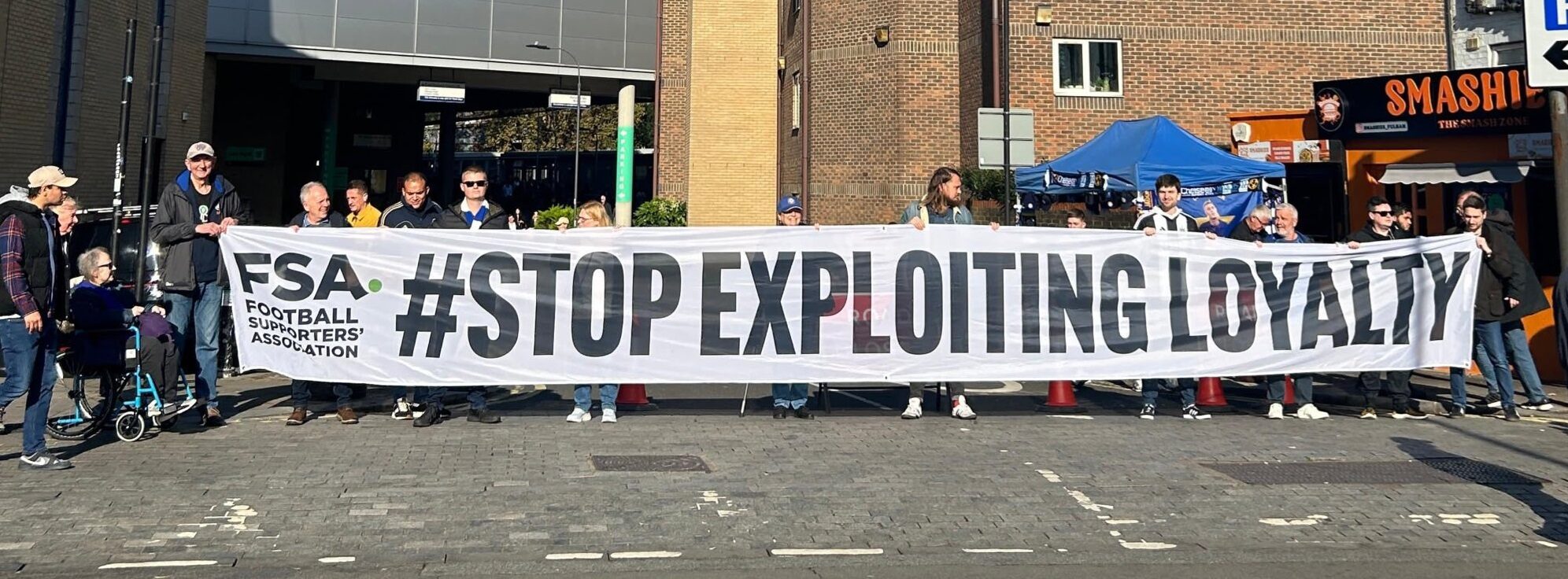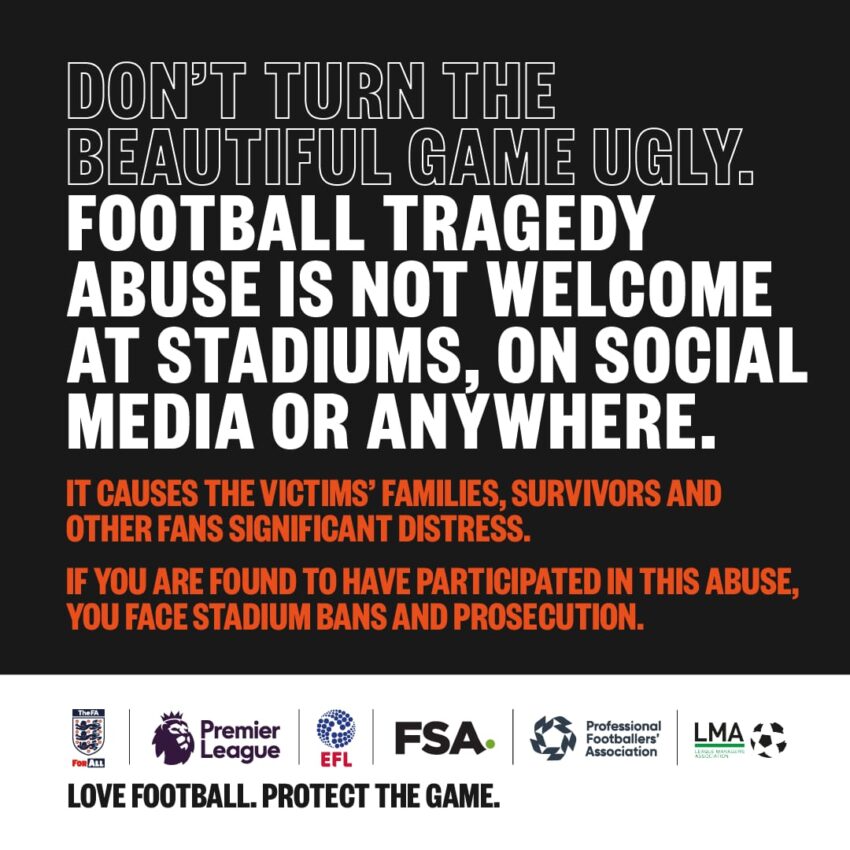The English football authorities are introducing a series of measures to help improve the behaviour of players, managers and coaches across the professional, National League system and grassroots game, as well as addressing the issue of football tragedy abuse.
New policies, procedures, and regulations will come into force from the start of the 2023-24 season, to address unacceptable conduct on the pitch, on the side-lines and in the stands, to ensure that the actions of the minority do not spoil the game for all.
This builds on the work carried out throughout last season to combat dangerous and illegal fan behaviour, supported by the ‘Love Football. Protect the Game’ football-wide campaign.
Participant behaviour – players & managers
As part of this reset, the FA, Premier League, EFL, Barclays Women’s Super League, Barclays Women’s Championship, National League System (Steps 1-4) and referees’ governing body PGMOL have collectively launched a new Participant Charter.
The charter which was developed in partnership with the League Managers Association (LMA) and Professional Footballers’ Association (PFA) will see stronger measures for players, managers, coaches, support staff and club officials to adhere to on a matchday.
Under the new approach, match officials will be empowered to take more robust action alongside a consistent application of the existing measures when participant behaviour falls below expected standards, and the FA will apply stronger supplementary disciplinary action.
Captains are expected to take responsibility for their teammates encouraging them to play fairly and show respect towards the match officials and their decisions.
Where match officials are confronted, surrounded or their personal space invaded by multiple players, at least one player will receive a card. The FA could also take further action against the club.
New measures will include:
- A new technical area code of conduct to require managers, coaches and other club staff members to behave in a responsible manner.
- Increased financial penalties for serious and repeat offenders.
- Academy scholars to undertake refereeing courses to improve players’ education into officiating.
For the grassroots game, the FA has announced new regulations from the start of the 2023-24 season, including point deductions for teams whose players or coaches commit repeated offences of serious misconduct.
The trial of bodycams for referees will continue into the 2023-24 season, while a new code of conduct will be introduced to set behavioural expectations and embed usage.
Fan Behaviour
To challenge the totally unacceptable presence of football tragedy abuse, for season 2023-24, regulation changes and tough new measures have been introduced which will see people who are found to have committed offences face stadium bans and potential criminal prosecution.
The issue is focused on offensive chanting, gesturing and displaying offensive messages based on football-related tragedies, which causes significant distress to the victims’ families, survivors and affected-club supporters. Football authorities, supporter groups and law enforcement organisations, including the police and Crown Prosecution Service, have united to crack down on fans who participate in this vile form of abuse.
In addition to bans and criminal sanctions, a range of in-stadium, in-classroom and online resources will be rolled out under the ‘Love Football Protect the Game’ banner, to educate adults and children alike about the hurt tragedy chanting causes.
Ground regulations have also been updated to incorporate references to tragedy chanting.
The game will also continue its efforts to combat dangerous, illegal and unwelcome behaviour off the pitch, be it in the stands or online. Last season a host of new measures were introduced by authorities which saw enhanced sanctions applied for people identified entering the pitch, using pyros, taking drugs to games, throwing objects or for discriminatory abuse.
Restorative justice pilot scheme
To support the rehabilitation of those identified as having engaged in negative matchday behaviour, a new pilot scheme is now in development phase which will refer young people to a restorative justice education programme that will seek to inform and educate about the impact of their behaviour on others.
The scheme is being run by the Premier League, EFL, Premier League Community Fund and the EFL Trust with support from local police forces and will be trialled at ten clubs across the Premier League, Championship, League One and League Two.
National League (Steps 5 and 6) and the grassroots game
Applicable to addressing both unwanted spectator and participant behaviour, the FA, working alongside Kick It Out, have created a joint action plan to tackle serious misconduct across Steps 5 and 6 of the National League system and grassroots football. The plan focuses on three key areas: increasing awareness and knowledge of serious incidents and how to report them; enhancing reporting processes by making them clearer and more accessible; and a commitment to tackling ‘problem areas’ in the game where serious incidents are most prevalent.
The outputs from the action plan will be rolled out across the season.
In addition, specific to the grassroots game, the FA will look at ways to encourage positive spectator behaviour, with leagues supported to run silent support weekends, to highlight the impact side-line behaviour can have on players.
Comment from across the game
Speaking ahead of the new season’s kick off, leaders from across English football offered insight into the game’s renewed efforts to improve participant and fan behaviour:
Mark Bullingham, chief executive of the FA: “Football has the unique power to unite, inspire and improve the lives of all those that play and watch the game at any level. However, in recent years we have seen how this can be negatively impacted by a small minority of players, coaches and fans.
“This season, English football is coming together with a commitment to address this unacceptable behaviour within our game, on the pitch and on the side-lines. We understand that it will take time to adapt to these new measures – but we are confident that they will have a positive impact at all levels.
“We are also determined to address the rise in unacceptable behaviour from the stands. Incidents such as dangerous conduct, discrimination, and chanting about football-related tragedies have no place in our game – and can lead to football bans and potential criminal action. Passion, emotion and excitement are fundamental to football, however this must be shown in the right way. Everyone can play their part, so that together we can create a safe and enjoyable environment for all.”
Richard Masters, chief executive of the Premier League: “Football has an incredible power to inspire people of all ages, and the professional game sets an example to all those who play and watch the sport.
“We want players, managers and fans to continue showing their passion, but these new measures have been introduced to ensure that the line is not crossed when it comes to on-field and technical area behaviour.
“We also strongly believe there is no room for abhorrent tragedy abuse in football. Along with our clubs and the authorities, we are committed to sanctioning those found guilty and will also focus on educating fans of all ages so they understand why this abuse is so hurtful and unacceptable.”
Trevor Birch, chief executive of the EFL: “Players and managers are looked up to and whether on the pitch, on the touchline or in the stands, we all have a role to play in protecting our game and making it an enjoyable place for all to enjoy the matchday.
“With over 22 million attending EFL games last season, vibrant, lively stadiums and contests on the pitch make our game so great, but there is a line, and we must all do our bit to check, challenge and address behaviour that crosses the line. These measures build on the work of last season, and I hope they improve the matchday experience yet further in what is promising to be another memorable season.”
Howard Webb, chief refereeing officer at PGMOL: “Football has come together and recognised that it’s time to change. There is a collaborative desire from all corners of the game to tackle unacceptable behaviour and we know we must play our part in delivering that.
“Whatever your role or connection with football, that pride and passion for the English game is there for us all and are key reasons why we love it, but the power of example is strong – what’s seen in the professional game is replicated at grassroots level. We have a collective duty to set new standards and leave a legacy for the benefit of the game’s future.”
Jack Pearce, FA vice-chair and chair of the National League: “It is vital that football comes together and acts now, to reset the culture within our game. Unfortunately, the game has normalised unacceptable behaviour in recent seasons and the message is clear; we will not allow this to continue. The National League System fully supports this approach and looks forward to seeing the impact it has across our leagues, ahead of what should be another thrilling season for us all”.
Douglas Mackay, deputy chief Crown prosecutor and sports national lead prosecutor: “The CPS continues to work closely with the football authorities including the Premier League, Football Association, English Football League, Women’s Super League, Women’s Championship, National League, police, clubs, and charities to look to stamp out these appalling and horrendous incidents of tragedy chanting and gesturing. We want supporters to enjoy and be passionate in following their teams but not cross the line into criminality. The CPS takes this offending extremely seriously as seen in our recent prosecutions of Zakir Hussain, James White and Kieron Darlow.
“We are sending a clear message that we call on so called fans to stop this vile behaviour of a minority which has a terrible impact on the bereaved and communities. If they do not then they face the risk of being excluded from the game they claim to love.”
Joe Blott, FSA National Council member: “The FSA welcomes the work that has been done to address the growing concern about football tragedy abuse. Vital to its success will be education and the role supporters have in developing empathy and understanding, talking about the negative and harmful impacts, but so too is recognition of consequences for supporters who continue to participate in such behaviour.
“Supporters have a long track record of policing ourselves so it’s vital that we show real leadership and demonstrate our opposition to tragedy chants, gestures and slurs at all grounds and on social media. Lets Keep the passion and lose the poison.”
https://www.premierleague.com/news/3611507
Football unites to improve participant & fan behaviour – 2023-24

